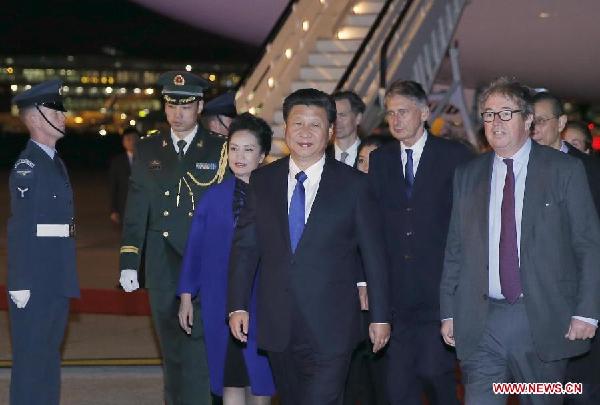
Chinese President Xi Jinping(C) and his wife Peng Liyuan (3rd L) arrive in London, Britain, Oct. 19, 2015, for a state visit to Britain at the invitation of Queen Elizabeth II. (Xinhua/Ju Peng)
Chinese President Xi Jinping is on a state visit to the United Kingdom from October 19 to 23. The UK will carry out an elaborately arranged reception for him. President Xi’s “exclusive visit” to the UK demonstrates China’s high attention to China-UK relations. We can predict that President Xi’s UK visit will take China-UK relations into a “golden era” when both sides enjoy more frequent strategic exchanges, closer economic and trade cooperation and both peoples see more practical benefits.
Britain also attaches great importance to President Xi’s visit with long-term preparations including Prince William’s visit to China this March, during which he handed over Queen Elizabeth II’s invitation to President Xi and the Queen’s announcement of her expectation of President Xi and his wife’s UK visit in her speech at the opening of the new British parliament. Meanwhile, British high-level leaders also showed their friendliness to China in the hope of promoting China-UK relations to a new phase via President Xi’s visit. British Prime Minister David Cameron first called this year the “golden year” of China-UK relations in his New Year speech. British Chancellor of the Exchequer George Osborne visited China this September, claiming that the UK wants to become China’s best trade partner.
Therefore, we can say that British government’s high expectation on President Xi’s visit reflects new thinking and new initiative to actively promote relations with China.
The UK: “Opportunity” key word for China-UK relations
British government expects close China-UK relations, hoping to seize development opportunities. At present, China is the UK’s fourth largest trade partner, while the UK is China’s second largest partner in the EU. In recent years, China and the UK have strengthened cooperation in bilateral trade, investment and finance, and “China impacts” in the UK’s economy is growing dramatically. Given the global economy’s current need for stability, the British government led by the Conservative Party will continue to take continuing economic growth as its main task.
Britain’s “sense of competition” in developing China-UK relations is strong. At the end of 2013, British PM David Cameron said that the “UK is prepared to be China’s strongest supporter in the West” during his first visit to China when China-UK relations improved. British government even tried to show its “uniqueness” as opposed to other countries, especially western countries. For instance, Britain takes itself as the most open economy in the EU, the country who welcomes China’s investment most, the one who wants to be the best trade partner of China in the West.
The UK was the first western country that announced to join the Asian Infrastructure Invest Bank (AIIB) in March, causing the domino effect that other advanced economies joined the AIIB one after another. British government also supports London to establish “the center for RMB in the West”. Therefore, Britain expressed its support for RMB’s admission into the IMF’s SDR basket at the IMF annual meeting.
It is a pragmatic move for the UK to maintain close China relations with China.
The UK also wants to rebuild its national image and increase its influence in the world through enhancing China-UK relations. Britain is always famous for its pragmatic diplomacy and maintains a strong perspective of overall situation of powers. Britain is traditional diplomatic power playing a more pro-active role in international affairs as a second-level power. But its global influence has weakened in the 21st century and its strength also declined due to financial crisis and economic crisis, resulting in the rise of conservative diplomacy and even “isolationist” feelings.
In recent years, British PM Cameron coped with the trend of Scotland’s national splittism and the “quit Europe” tide through “referendum”, but Britain’s national status and its position in Europe has been in huge uncertainty.
Under such circumstance, enhancing China-UK strategic exchanges via model innovation to cope with new changes in international pattern obviously has become the UK government’s new option to upgrade its influence.
British mainstream public opinion is in favor of befriending China
It is not only British mainstream political consensus, but also prevalent public opinion to be friendly to China. The British PM Cameron and Chancellor of the Exchequer George Osborne’s efforts to improve UK-China relations have received firm support from mainstream political leaders. A poll by BBC in last June shows that the proportion of British people who kept a positive attitude to China increased dramatically.
Therefore, the grand royal welcome ceremony for President Xi shows the entire British society’s high expectations on the bilateral relations based on mutual benefit and win-win results. As the UK is a major advanced economy and a western power with global influence, it is also of great significance for China to develop close China-UK relations in economic development and improvement of people’s wellbeing as its economy enters a state of New Normal.
China has expanded its investments in the UK from Huawei’s large-scale participation in British telecommunications industry to infrastructure construction, including nuclear power plant, airport, water-related affairs and even high-speed rail, which is rare in the West. And Britain, a country that does well in finance and service industry, will also play a unique role in China’s future economic development.
Contributed by Yang Fang, associate researcher of China Institutes of Contemporary International Relations, for Guangming Daily
Translated by Zhang Zhou